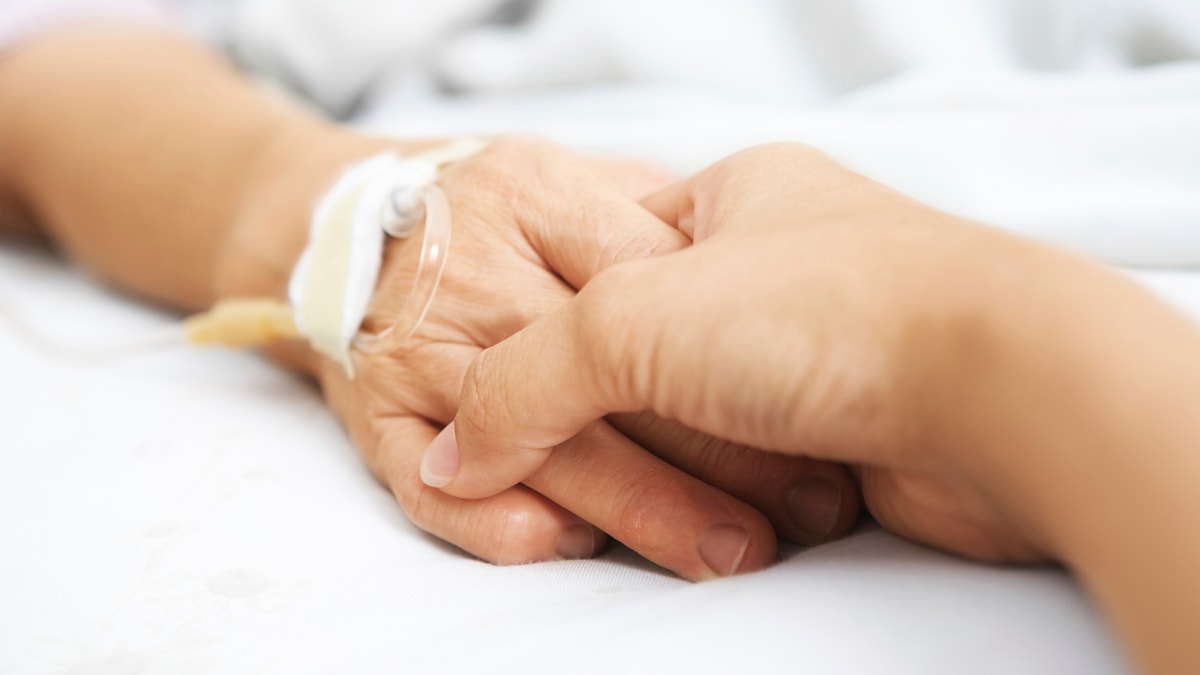
Daughter holding her mother hand, that injected with IV in hospital (©Rudyanto Wijaya)
It may seem sort of fun to be laid up in an adjustable bed surrounded by piles of magazines and having full command of the remote. But the truth is, if you've ever had even the shortest of hospital stays, it's no picnic. It only gets worse when a friend comes to visit and, without intending to, says exactly the wrong thing. Read on for the eight things not to say to someone who's in the hospital. (Lose 15 pounds in 3 weeks by balancing your hormones—here’s how!)
"You must be getting so much rest!"
Even the nicest friends said some version of this statement to Mary Ladd, who endured seven surgeries and eight infections after a breast cancer diagnosis.
"I don't get any rest," she said. "The plastic sheets ensure that I'm a sweaty mess all night long. Plus, the staff wakes me up every hour on the hour!" (Always exhausted? Check out these 7 reasons you're tired all the time.)
"I completely understand what this is like."
Unless you've gone through the exact same thing, it's impossible to understand what someone battling a severe illness or recovering from a major medical procedure is going through.
"To be helpful, be empathetic by saying that you can only imagine what they're going through," said Dr. Nitin Kumar, a gastroenterologist in Addison, IL. "Then offer specific ways to help out, as in, 'May I bring your mom a cup of coffee?' or 'May I bring dinner to your family while you're here?'" (Here's how to help a loved one in the hospital.)
"It could be worse" or "I don't think it's serious."
Patients admitted to a hospital are already worried about their health, missing work or family activities, and bills accruing.
"Telling them that it could be worse can remind them of the possibilities and create anxiety," Kumar said. "Likewise, commenting on whether something is or isn't serious will trivialize concerns and also increase anxiety." To be helpful, focus on making the patient's day better: "Changing the topic away from medicine during the visit can be a good thing," Kumar said. (Here are 10 things to never say to someone with cancer.)
"You're so lucky you get to binge-watch Netflix!"
No one is lucky to be in a hospital. If you're recovering from major surgery or seriously sick, watching House of Cards is probably the last thing on your mind.
"Asking someone if they're caught up on Netflix demeans what they're going through," said Nicole Richardson, a licensed professional counselor in Austin, TX.
"Have you tried eating organic?"
For Alicia Kan, being asked if she changed her diet while she was lying in a hospital bed was upsetting. "Actually, yes, I had been eating organic for years prior to being diagnosed with cancer in 2004," she said. "I exercised three times a week with trainers. I even refused to hold a mobile phone to my ear because I was worried about radiation. Don't assume that someone gets cancer because of poor health habits." (Take a look at the 10 cancer symptoms most people ignore.)
"Think positively!"
There's a fine line between looking on the bright side and being artificially cheerful.
"When you've got five tubes running out of you and have to call a nurse to turn on your side, it's a wee bit difficult to think of sunshine and puppies," Kan said. "Save it."
"You look tired/old/a mess."
"I'm surprised by how often visitors suggest that a patient looks unkempt," Kumar said. "It's difficult to keep up your appearance without your usual bathroom and beauty supplies. Hospital gowns are not necessarily flattering, but they are purposely designed to allow medical exams and efficient care in emergencies."
"One day you'll look back and see this as a gift."
"This is meant as a reassurance but, to someone suffering, it comes across as incredibly patronizing," Kan said. Instead, focus on what you can do to help. "You wouldn't believe what a hospital patient is hankering for," she said. "I wanted a Happy Meal—badly—after eating hospital food for weeks. I wanted dark chocolate and all the James Bond films, from Dr. No onward. The best visitors asked what they could do. I got my fixes and we remained good friends."








































